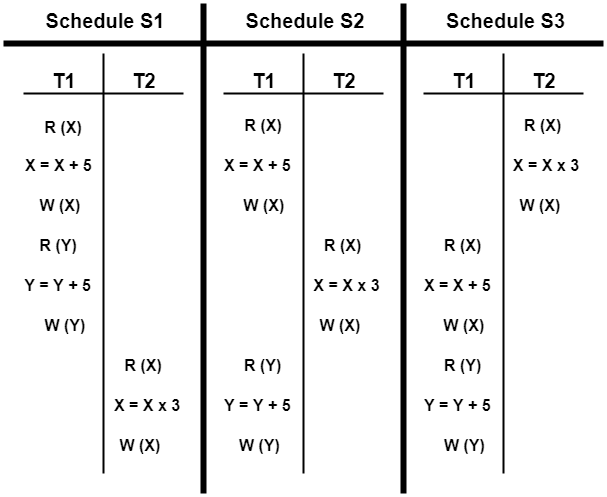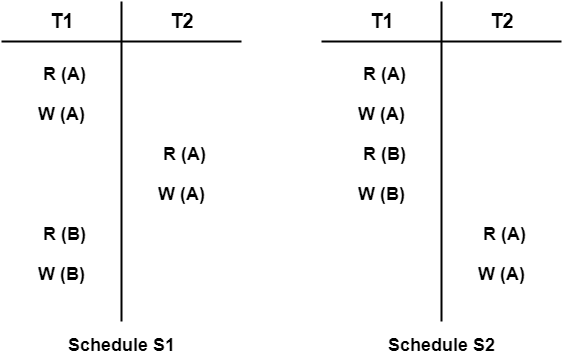Equivalence of Schedules-
In DBMS, schedules may have the following three different kinds of equivalence relations among them-

- Result Equivalence
- Conflict Equivalence
- View Equivalence
1. Result Equivalent Schedules-
- If any two schedules generate the same result after their execution, then they are called as result equivalent schedules.
- This equivalence relation is considered of least significance.
- This is because some schedules might produce same results for some set of values and different results for some other set of values.
2. Conflict Equivalent Schedules-
If any two schedules satisfy the following two conditions, then they are called as conflict equivalent schedules-
- The set of transactions present in both the schedules is same.
- The order of pairs of conflicting operations of both the schedules is same.
3. View Equivalent Schedules-
We have already discussed about View Equivalent Schedules.
PRACTICE PROBLEMS BASED ON EQUIVALENCE OF SCHEDULES-
Problem-01:
Are the following three schedules result equivalent?

Solution-
To check whether the given schedules are result equivalent or not,
- We will consider some arbitrary values of X and Y.
- Then, we will compare the results produced by each schedule.
- Those schedules which produce the same results will be result equivalent.
Let X = 2 and Y = 5.
On substituting these values, the results produced by each schedule are-
Results by Schedule S1- X = 21 and Y = 10
Results by Schedule S2- X = 21 and Y = 10
Results by Schedule S3- X = 11 and Y = 10
- Clearly, the results produced by schedules S1 and S2 are same.
- Thus, we conclude that S1 and S2 are result equivalent schedules.
Problem-02:
Are the following two schedules conflict equivalent?

Solution-
To check whether the given schedules are conflict equivalent or not,
- We will write their order of pairs of conflicting operations.
- Then, we will compare the order of both the schedules.
- If both the schedules are found to have the same order, then they will be conflict equivalent.
For schedule S1-
The required order is-
- R1(A) , W2(A)
- W1(A) , R2(A)
- W1(A) , W2(A)
For schedule S2-
The required order is-
- R1(A) , W2(A)
- W1(A) , R2(A)
- W1(A) , W2(A)
- Clearly, both the given schedules have the same order.
- Thus, we conclude that S1 and S2 are conflict equivalent schedules.
Next Article- Introduction to Relational Algebra
Get more notes and other study material of Database Management System (DBMS).
Watch video lectures by visiting our YouTube channel LearnVidFun.